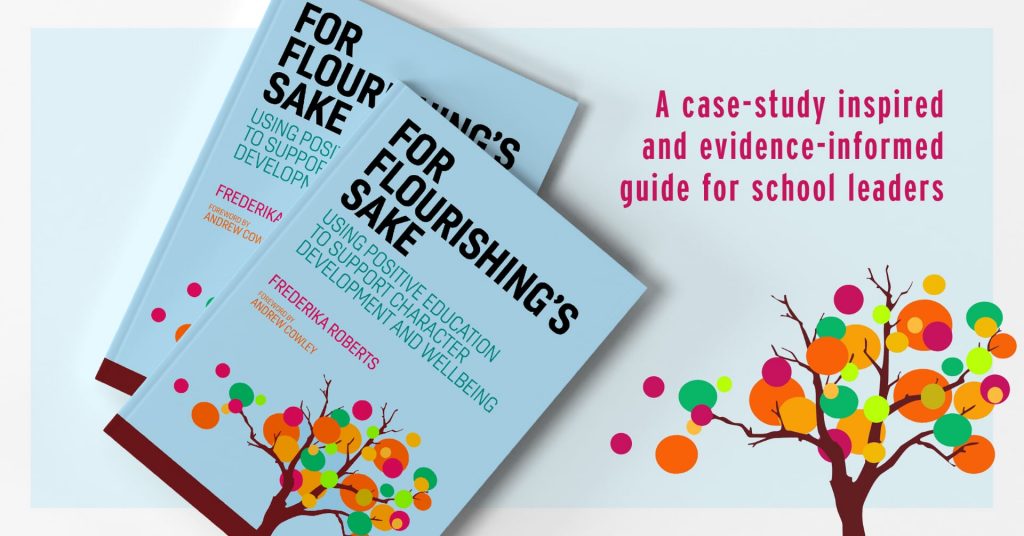
Frederika Roberts invites us to keep sight of the important role schools play in supporting well-being of children and staff
Why do we send children to school? To learn, of course, but is that all schools are there for? At the start of my book, I ask the reader “why did you become a teacher?” According to the Education Support Partnership’s 2018 and 2019 Teacher Wellbeing Index reports, the main aspect teachers love about their job is making a difference, and according to Seligman et al.’s 2009 paper on positive education, what most parents want for their children are well-being-related outcomes, yet what schools focus on and are measured on is mostly attainment-related.
The two are not mutually exclusive, of course. Positive Education is the combination of supporting children’s wellbeing and character development and academic achievement. In short, Positive Education supports children’s flourishing in every sense of the word.
At the end of my first paragraph above, I do many schools a great injustice. Whilst most schools in many countries worldwide and certainly here in the UK, where I am based, are targeted and measured mostly on attainment, many schools do a great deal of fantastic work on supporting children’s well-being and character development. Many do this without realising it; schools are full of role-models of every kind (staff and pupils), the processes children follow as they go through education teach them about self-regulation and perseverance, when children learn about history and literature, they inevitably learn something about the character strengths of the people they read about.
But some schools are better at this stuff than others. Some schools choose to deliberately focus on integrating well-being and character with academic learning. Those that do this particularly well take a whole-school approach to Positive Education, considering all elements: From communication with and involvement of all stakeholders (the local community, parents, governors, staff and pupils), to the school’s ethos and policies and the attitudes of the leadership team, to the many ways you can see a dedication to well-being throughout the school building and the behaviours exhibited by staff and pupils alike. These schools also tend to have both dedicated well-being and / or character lessons and weave this learning through other subject lessons and extra-curricular activities. Very importantly, they all share a strong focus on staff well-being, because if staff aren’t well, they cannot support children’s learning or indeed well-being. There are so many ways in which schools can and do take a whole-school Positive Education approach…I could write a book about it. In fact, I did!
What made the book such a pleasure to write was that it gave me an excuse to interview some amazing school leaders, teachers, well-being leads and educational consultants from around the world and draw out their stories and experiences of Positive Education. They don’t all call what they do “Positive Education”, but the umbrella term fits. From exclusive independent schools in Australia and Dubai to tiny state-funded primary schools in the UK and just about every type of school in-between in a number of countries and continents, I have had the privilege of getting a glimpse of what so many educators are doing so well: Supporting children’s flourishing.
If you’d like to hear some of their stories, you can do so during my virtual book launch extravaganza:
On 18th June and 21st August, the contributors to For Flourishing’s Sake will join me over a series of 4 panel discussions covering some of the topics of the book and bringing them up to date with the current situation.
You can find all the details, including how / where to watch the panels (live and replays) here.
Since I wrote my book, so much has changed in our world. Education has borne much of the brunt of the disruption and who knows what our ‘new normal’ will look like! One thing hasn’t changed though: Well-being matters and belongs at the heart of education. Teachers and school leaders tell me every day how much time and effort they are dedicating to ensuring they can support the well-being of their children and their colleagues in these difficult times and as we move forward. It’s going to be challenging, we’ll face many obstacles (not least how to foster positive relationships and provide a physical environment conducive to mental well-being when having to teach in socially-distanced classrooms!), but with determination and by taking small steps, we can do this.
My book ends on a rallying cry which, I believe, is more relevant than ever:
For flourishing’s sake, take the first step, however small, and join hands with the millions of other educators taking small steps! Together, we are unstoppable!
Frederika Roberts is a former secondary teacher and a positive psychology, positive education and character education speaker and trainer. She is the founder of Educate to Flourish CIC, author of Recipe for Happiness and For Flourishing’s Sake and co-author of Character Toolkit for Teachers and its companion, Character Toolkit Strength Cards. She tweets @Frederika_R
For Flourishing’s Sake is out on 18th June 2020 for Kindle and 21st August 2020 in paperback. The Character Toolkit Strength Cards are also published on 18th June 2020.